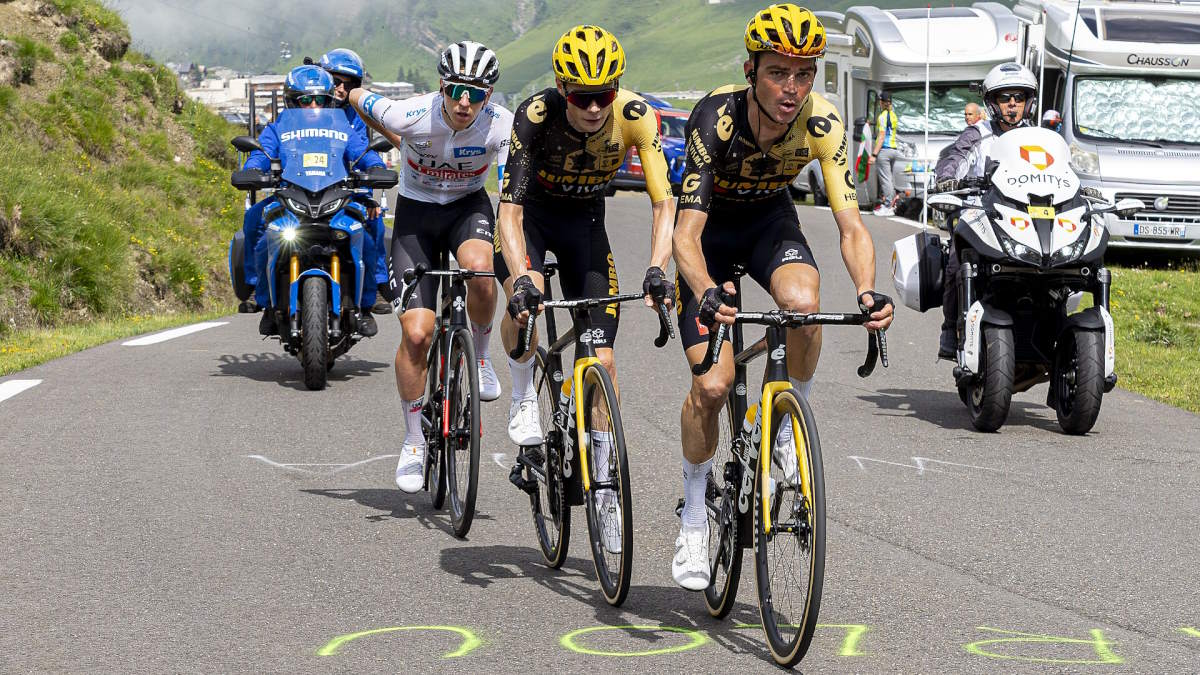A domestique (domestic) is a rider in professional road cycling who works for the benefit of their team and leader, rather than trying to win the race. The term is derived from French and translates to “servant”. The roles of a domestique may include setting the pace to tire out rivals, providing slipstreams for team leaders to ride in, chasing breakaway riders, providing mechanical or physical assistance, and carrying supplies like water and food from the team car during the race.
The Critical Role of Domestiques in Overcoming Air Resistance in Cycling
In cycling, the majority of the work done by a cyclist when moving at speed on flat ground is overcoming air resistance. As the cyclist moves forward, they push against the air in front of them, creating resistance. This resistance increases roughly with the square of the speed, meaning that the faster a cyclist goes, the more energy they need to expend to overcome the air resistance.
This is where the role of domestiques (servants, or in order to be more kind, helpers) becomes vital in professional road cycling. By positioning themselves at the front of their team, domestiques face the brunt of the air resistance, effectively shielding the team leader and other key riders from much of this force. This allows the team leader to ‘draft’ or ride in the slipstream of the domestique, which significantly reduces the energy they need to expend to maintain the same speed.
Therefore, a domestique’s job is essentially to sacrifice their own chances of winning the race to help their team leader conserve energy for the most critical parts of the race. Without the tireless work of the domestiques, the team leader would have to expend a lot more energy against air resistance, which could seriously hinder their performance in the race. This selfless role, although often unnoticed by casual spectators, is a critical component of team strategy in professional road cycling.

Please note that the Italians use the term “gregario” for a domestique. In Italian, gregario means “member of a group” or “follower” in a general sense, but in the context of cycling, it refers to a team rider who works in support of the team’s leader.
Roles of Domestiques
Domestiques have a crucial role to play in positioning their team leader for success, especially before and during significant challenges such as steep climbs, narrow or windy roads, and more. Here’s a breakdown of how they might do this:
Before/During Important Climbs:
Climbs are one of the most challenging parts of any race. The domestique’s role before a climb is to set a hard pace to wear down other teams and to position the team leader at the front of the peloton (main group of riders) to avoid any potential crashes or bottlenecks.
As the climb begins, the domestique will continue to set a steady pace to shield the team leader from the wind and allow them to conserve energy. In particularly grueling climbs, a team might employ a super-domestique (a rider who could be a team leader in their own right) to maintain this role as the group thins out. The goal is to keep the team leader in the best possible position for as long as possible so that they can then break away and push for the summit when the moment is right.
They can also act as satellite riders.
Narrowing Roads:
On narrowing roads, positioning becomes vital. A domestique will work hard to keep the team leader near the front of the group where it’s safer, and where the leader has more control over their own destiny. Being near the front also means they can respond more quickly to attacks from rival teams.
Windy Conditions:
In windy conditions, a domestique may ride directly in front of the team leader to shield them from the headwinds, thus allowing the leader to save energy by riding in their slipstream. If the wind is coming from the side (crosswind), domestiques may ride slightly ahead and to the windward side of their leader, creating a protective ‘echelon’ formation.
All these strategies aim to preserve the team leader’s energy as much as possible for the critical moments in the race, whether that’s a punishing climb, a high-speed descent, or a sprint finish. The tireless work of the domestiques, often away from the limelight, forms the backbone of any successful cycling team.

Do domestiques win races for themselves?
Yes. Despite the seemingly subordinate role, being a domestique is crucial to team strategy and requires a high level of skill, endurance, and selflessness. In many cases, a successful team leader cannot win without the support of dedicated domestiques. They might not receive the same level of attention as the race winners, but their role is highly valued within the sport. Occasionally, domestiques may also have the opportunity to go for stage wins, particularly in large stage races like the Tour de France, or Giro d’Italia, if the team’s overall strategy allows it.
Circumstances such as crashes, mechanical problems, or health issues can cause the team leader to lose significant time or to abandon the race entirely. When such situations occur, teams often reassess their strategy and may designate a particularly strong domestique to step into the leader’s role.
Since these domestiques are typically strong riders themselves, they may indeed be able to win stages, or even the overall race, given the right circumstances. This potential shift in roles underlines the importance of every member of a team in cycling, not just the designated leader. The sport requires not only physical strength and endurance but also adaptability and strategic planning in response to often unpredictable race developments.
For instance, during the 2020 Giro d’Italia, Team Ineos Grenadiers’ designated leader Geraint Thomas had to abandon the race due to a crash. Tao Geoghegan Hart, originally serving as a domestique, then took over the leadership role and ultimately won the Giro.
Furthermore, team roles are not fixed and can change dramatically based on the unpredictable nature of the race. While teams start with a clear leader and domestiques, unforeseen events like crashes, illness, or time losses can force a shift in strategy. When a designated leader falters, domestiques may step up to fill the leadership role, provided they are performing well and positioned competitively in the race.
Domestiques, especially the super domestiques are often strong riders themselves, capable of excelling under the right circumstances. Their primary job is to support the leader by setting the pace, chasing breakaways, fetching supplies, and protecting them in the peloton. However, if the leader loses too much time or faces other setbacks, a well-performing domestique might take on the leadership mantle. This role reversal allows the team to adjust its strategy to maximize its chances of success, demonstrating the flexibility required in professional cycling.
2011 Vuelta a España
For example, during the 2011 Vuelta a España, Chris Froome began the race as a domestique for Bradley Wiggins, but Wiggins struggled on key stages and fell behind in the standings. Froome’s exceptional performance on the climbs and overall consistency led Team Sky to shift its focus, elevating him to the role of team leader.
Froome ultimately finished second overall, but then, showcased the importance of adaptability in a race.
The story of the 2011 Vuelta didn’t end there. On 13 June 2019, the Union Cycliste Internationale (UCI), cycling’s governing body, announced that Juan José Cobo had been found guilty of an anti-doping violation based on irregularities in his biological passport. Consequently, the UCI imposed a three-year period of ineligibility and stripped Cobo of his 2011 Vuelta a España title on 18 June 2019.
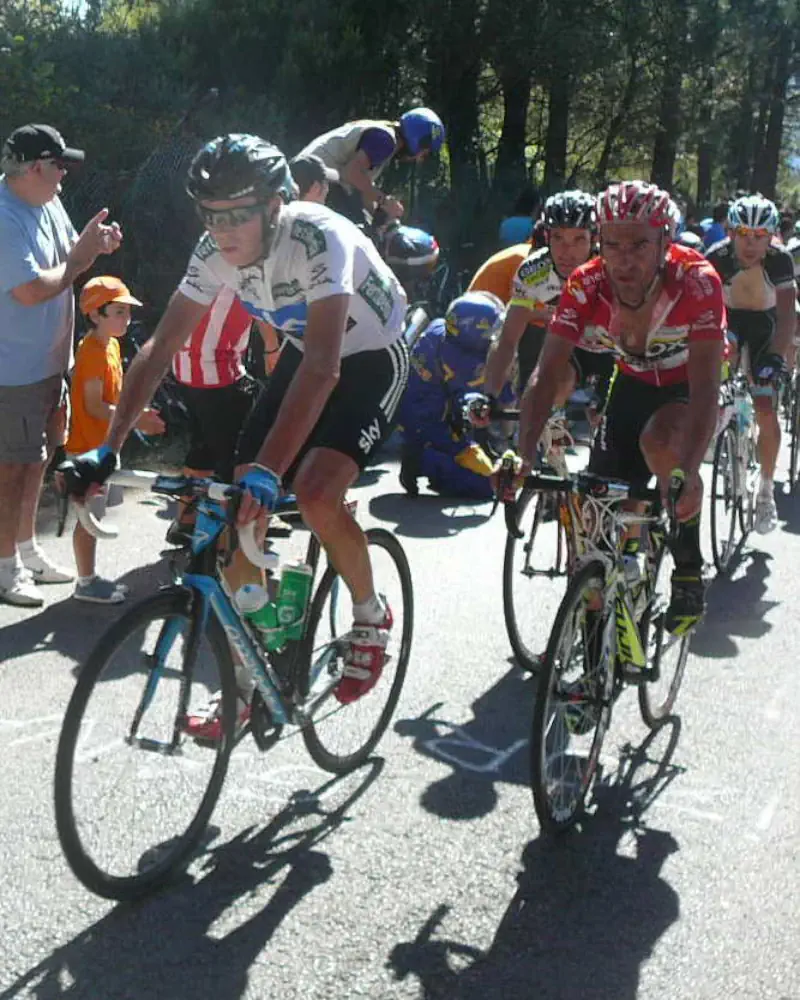
By 17 July 2019, with Cobo having failed to appeal the decision within the allowed timeframe, the UCI officially declared Chris Froome as the 2011 Vuelta champion, making him retroactively the first Briton to win a Grand Tour. Froome was also awarded victory in the combination classification. Bradley Wiggins, originally in third place, was promoted to runner-up, marking his second Grand Tour podium promotion due to doping disqualifications. Bauke Mollema moved up to third place to complete the revised podium.
2023 Vuelta a España
Another striking example of a role reversal in cycling occurred during the 2023 Vuelta a España with Sepp Kuss of Team Jumbo-Visma. Kuss, originally serving as a domestique for team leaders Jonas Vingegaard and Primož Roglič, found himself unexpectedly in contention for the overall victory. Known for his exceptional climbing abilities and tireless work in support of his teammates, Kuss initially rode in his usual role, helping to pace and protect his leaders in the high mountains.
However, an early stage saw Kuss gain significant time over his team leaders and other GC contenders: On Stage 6 of the 2023 Vuelta a España, from La Vall d’Uixó to Observatorio Astrofísico de Javalambre, Sepp Kuss launched an attack initially intended to support his Jumbo-Visma team leaders, Jonas Vingegaard and Primož Roglič. His role was to set a high tempo and put pressure on rival teams, softening up the competition for his leaders to capitalize on later in the stage.
However, as the stage unfolded, Kuss’s move turned into something far greater. His attack created a significant gap, and the peloton, misjudging the danger, allowed him to extend his lead. By the time the climbers behind began to react, Kuss’s margin had grown too large to close. What began as a tactical move for his team leaders ended with Kuss crossing the finish line solo, securing an impressive stage victory and gaining valuable time in the General Classification. He took the red jersey on stage 8, where Roglic won.
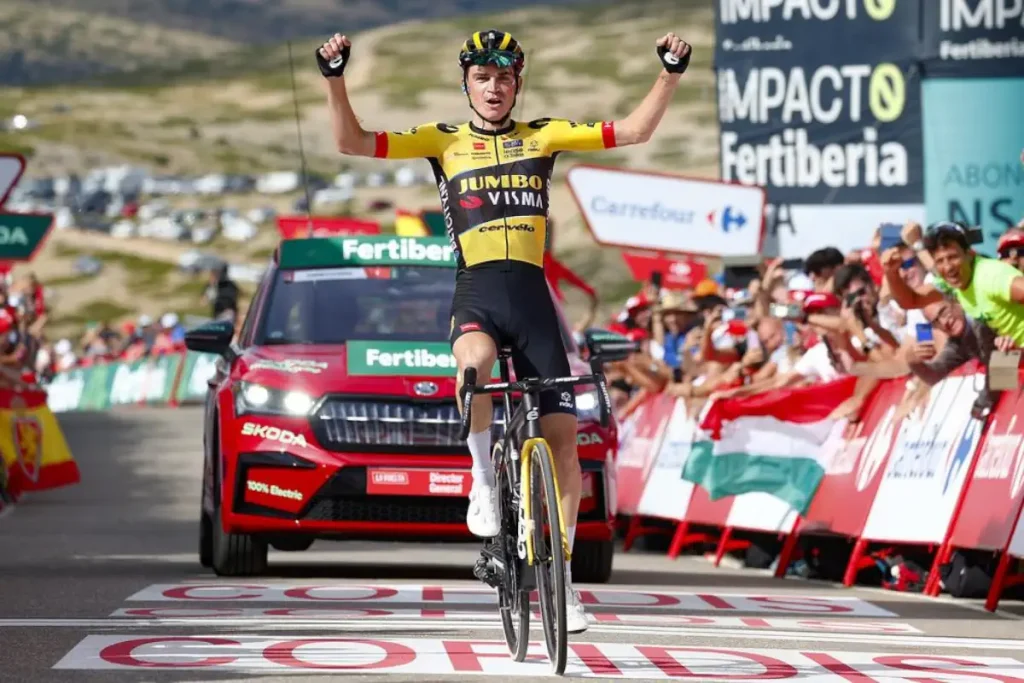
This scenario is an excellent example of a fuga di bidon, a term in cycling that refers to a breakaway effort where the main contenders or peloton underestimate the rider’s intentions or potential. Often dismissed as harmless, such moves can lead to surprising outcomes, as in Kuss’s case. His performance on this stage not only showcased his climbing prowess but also set the foundation for his unexpected run to become the overall leader later in the race. It was a turning point in the 2023 Vuelta, highlighting Kuss’s strength and ability to seize opportunities when they arise.
As the race unfolded, Vingegaard and Roglič initially demonstrated their support for Kuss, but this dynamic was tested on the infamous Angliru climb. During this pivotal stage, neither Vingegaard nor Roglič waited for Kuss as the pace intensified, putting his red jersey at risk. In an unexpected twist, it was Mikel Landa, a rider from another team (Bahrain-McLaren), who ultimately helped Kuss. Competing for his own GC ambitions, Landa worked with Kuss, helping him limit his losses to just 17 seconds on Vingegaard and 1 minute 8 seconds on Roglič, effectively saving Kuss’s lead and preserving his shot at overall victory.
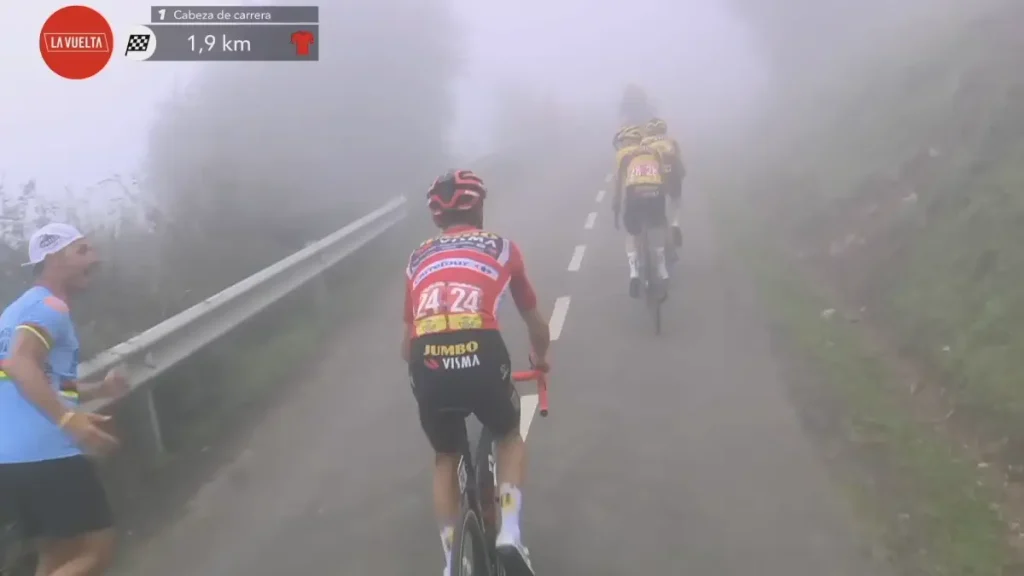
In summary, while a domestique’s primary role is to support their team leader, they also must be ready to step into that leading role themselves if circumstances demand it. This makes them not only support riders but also potential race leaders.
What is a Super-domestique?
A “super-domestique” is a term used in professional cycling to describe a rider who, in any other team, would be a leader due to their superior skills and performance. However, within their current team, they work in a support role to the designated leader.
Super-domestiques are typically capable of winning stages or even entire races themselves, but their primary role is to support their team leader. They are often the last riders to assist the team leader in challenging parts of the race, such as steep mountain climbs or challenging individual time trials.
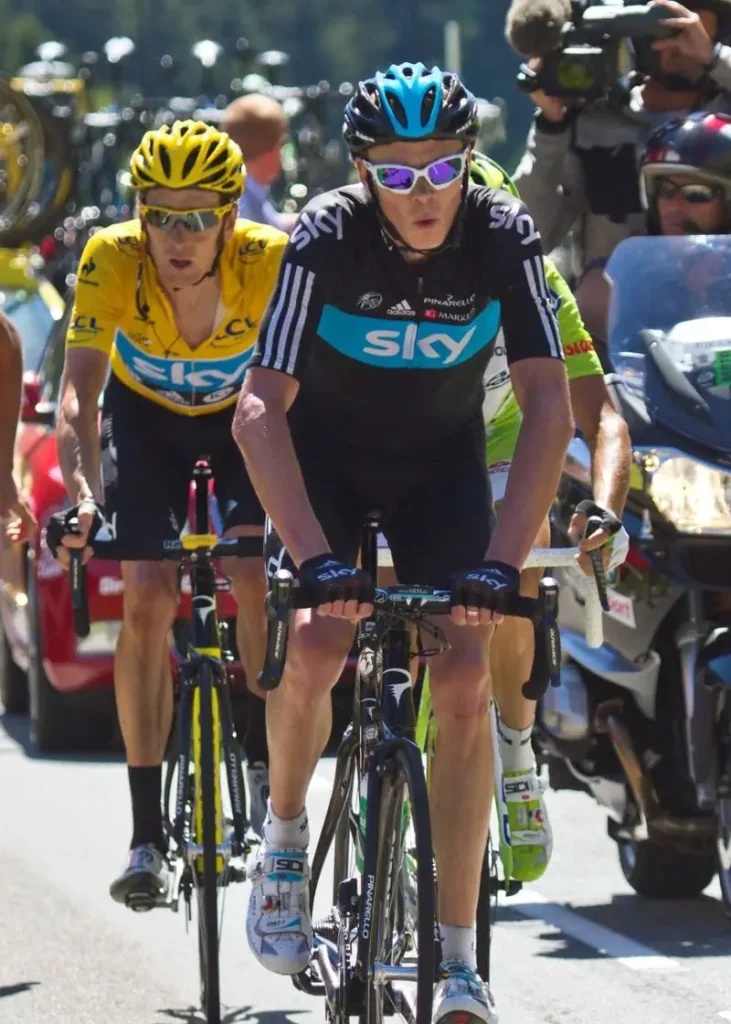
Their role is to pace the team leader, chase breakaways, and shield the leader from the wind to reduce air resistance (a strategy known as drafting). They also protect the leader from attacks by other teams and are generally there to handle any unexpected issues that may arise during the race.
The concept of the super-domestique highlights the team-oriented nature of professional cycling. Even though these riders have the capability to be leaders themselves, they sacrifice their individual ambitions for the good of the team. Their contributions are highly valued, and they play a crucial role in the team’s overall success.
The origin of the word “Domestique”
The term ‘domestique’ was initially used in the world of professional cycling as a form of derogation for Maurice Brocco (28 January 1883, in Fismes – 26 June 1965, in Mûrs-Erigné), a prominent French professional road bicycle racer who competed between 1906 and 1927. Its first known use occurred under intriguing circumstances during the 1911 Tour de France.
Brocco’s potential for winning the 1911 Tour was dashed when he lost significant time on the route to Chamonix. Recognizing that he was out of contention for the overall victory, Brocco leveraged his reputation and offered his services to other competitors. François Faber, another racer, was facing potential elimination due to slow times, and he struck a deal with Brocco. Brocco decided to pace Faber, guiding him toward the finish line and saving him from elimination.

This action provoked the ire of the Tour’s organizer and chief judge, Henri Desgrange, who viewed it as a breach of the rules. However, lacking concrete proof and fearful that Brocco would appeal to the Union Vélocipédique Française, the national cycling body, Desgrange refrained from disqualifying him. Instead, he voiced his disapproval in his newspaper, L’Auto, where he labeled Brocco as ‘unworthy’ and a ‘domestique’. In his newspaper, L’Auto, Desgrange wrote:
“He [Brocco] is unworthy. He is no more than a domestique.”
Brocco, unfazed, vowed to ‘settle accounts’ with Desgrange. The next day, he stunned everyone by winning the stage by a staggering 34 minutes. As he passed other riders, including the yellow jersey wearer Gustave Garrigou, he taunted Desgrange, challenging the notion of his unworthiness. He showed his true abilities, underscoring that his earlier poor performance with Faber was a strategic choice rather than a lack of capability.
Desgrange, acknowledging Brocco’s talent, suggested that the racer had been ‘selling the race’. He called for Brocco’s disqualification, stating, “He deserves his punishment.”
While the role of domestiques had been accepted in other races, Desgrange was steadfast in his belief that the Tour de France should be a competition of individual prowess. His disputes with race sponsors, primarily bicycle factories that had different views, were frequent. It wasn’t until 1930, when Desgrange restructured the Tour de France to involve national teams, that he inadvertently acknowledged the role of teamwork and, consequently, the importance of domestiques in professional cycling. This crucial evolution acknowledged the undeniable reality of cycling as a team sport, thereby forever changing its dynamic.
The lowest rank of domestiques: The Watercarriers
“Stars and Watercarriers” is a renowned documentary film that follows the 1973 Giro d’Italia, one of the most prestigious annual cycling races. Directed by Jørgen Leth, the film provides a fascinating glimpse into professional cycling, focusing on both the ‘stars’, or leaders of the race, and the ‘watercarriers’, the term used to refer to the lowest rank of domestiques.
The title metaphorically encapsulates the diverse roles within a professional cycling team. The ‘stars’ are the team leaders, the highly skilled cyclists who are the primary contenders for the race win. They are the ones who receive most of the attention and glory. The ‘watercarriers’, on the other hand, are the workhorses of the team, often underappreciated yet vital for their team’s success. Their role, akin to domestiques, is to support their team leader by doing the bulk of the work, including carrying water bottles, setting the pace, and shielding their leaders from the wind.
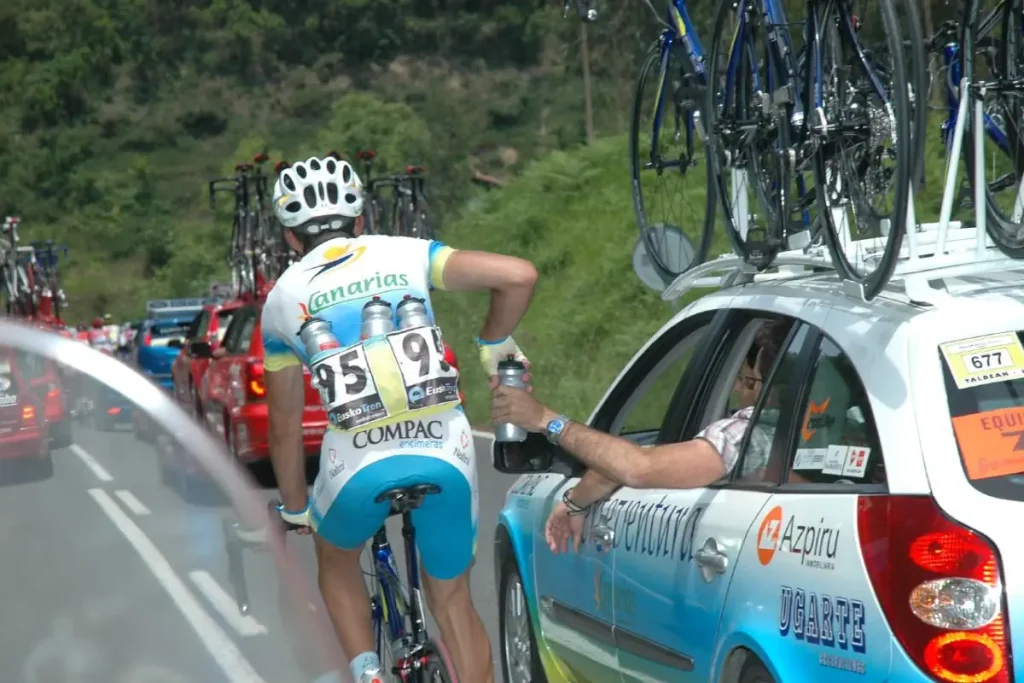
This film provides a close-up view of the grueling, often thankless role of the watercarriers and highlights the stark contrast between the glory pursued by the stars and the hard, supporting work done by the domestiques. It emphasizes that, while the stars may take the accolades, they rely heavily on the tireless work of the watercarriers, who make significant sacrifices for the team’s success. In essence, “Stars and Watercarriers” underscores the inherently team-oriented nature of professional cycling.
In modern cycling, however, the traditional role of “watercarriers” as a distinct category within teams has largely faded into the past. Today, the responsibility of retrieving bottles or performing similar tasks is not limited to a specific rider but is instead shared among the domestiques based on the needs of the race. Depending on the situation, any domestique can step into the role of a watercarrier. In fact, there are even occasions where team leaders themselves fetch bottles for their teammates, demonstrating the increasingly fluid and adaptable dynamics within professional cycling teams. This shift reflects the sport’s evolution, where teamwork and flexibility are prioritized over rigid hierarchies.
Sources
- Domestique on Wikipedia
- UCI Elite Men Road Race World Champions: The Complete List [1927-2025] - September 28, 2025
- What Is Zone 2 In Cycling? - September 12, 2025
- The Turkish Flag at the Tour de France: Who’s Waving It at the Finish Line? - July 30, 2025
